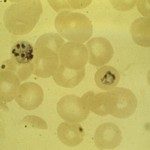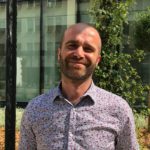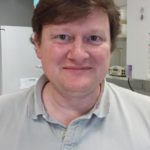Lien vers Pubmed [PMID] – 37754284
Lien vers HAL – hal-04225218
Lien DOI – 10.1056/NEJMoa2210956
New England Journal of Medicine, 2023, 389 (13), pp.1191-1202. ⟨10.1056/NEJMoa2210956⟩
Background Although the clinical efficacy of antimalarial artemisinin-based combination therapies in Africa remains high, the recent emergence of partial resistance to artemisinin in Plasmodium falciparum on the continent is troubling, given the lack of alternative treatments. Methods In this study, we used data from drug-efficacy studies conducted between 2016 and 2019 that evaluated 3-day courses of artemisinin-based combination therapy (artesunate–amodiaquine or artemether–lumefantrine) for uncomplicated malaria in Eritrea to estimate the percentage of patients with day-3 positivity (i.e., persistent P. falciparum parasitemia 3 days after the initiation of therapy). We also assayed parasites for mutations in Pfkelch13 as predictive markers of partial resistance to artemisinin and screened for deletions in hrp2 and hrp3 that result in variable performance of histidine rich protein 2 (HRP2)–based rapid diagnostic tests for malaria. Results We noted an increase in the percentage of patients with day-3 positivity from 0.4% (1 of 273) in 2016 to 1.9% (4 of 209) in 2017 and 4.2% (15 of 359) in 2019. An increase was also noted in the prevalence of the Pfkelch13 R622I mutation, which was detected in 109 of 818 isolates before treatment, from 8.6% (24 of 278) in 2016 to 21.0% (69 of 329) in 2019. The odds of day-3 positivity increased by a factor of 6.2 (95% confidence interval, 2.5 to 15.5) among the patients with Pfkelch13 622I variant parasites. Partial resistance to artemisinin, as defined by the World Health Organization, was observed in Eritrea. More than 5% of the patients younger than 15 years of age with day-3 positivity also had parasites that carried Pfkelch13 R622I. In vitro, the R622I mutation conferred a low level of resistance to artemisinin when edited into NF54 and Dd2 parasite lines. Deletions in both hrp2 and hrp3 were identified in 16.9% of the parasites that carried the Pfkelch13 R622I mutation, which made them potentially undetectable by HRP2-based rapid diagnostic tests. Conclusions The emergence and spread of P. falciparum lineages with both Pfkelch13-mediated partial resistance to artemisinin and deletions in hrp2 and hrp3 in Eritrea threaten to compromise regional malaria control and elimination campaigns.










